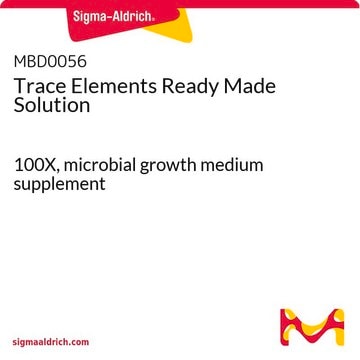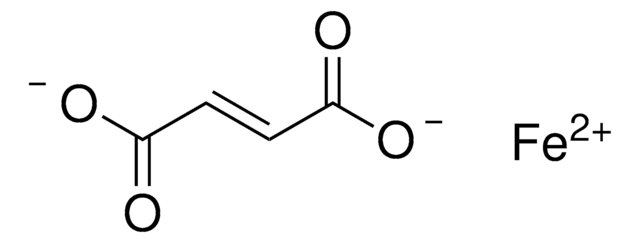F0518
Ferrous sulfate chelate solution
100 ×, suitable for plant cell culture
Sign Into View Organizational & Contract Pricing
All Photos(1)
About This Item
UNSPSC Code:
10171502
NACRES:
NA.72
Recommended Products
sterility
sterile-filtered
form
solution
concentration
100 ×
technique(s)
cell culture | plant: suitable
application(s)
agriculture
storage temp.
2-8°C
Application
Ferrous:EDTA chelate is a redox active form of bound iron. Ferrous:EDTA chelate will give up its iron to plant iron chelators. This iron chelate may be useful in a wide range of studies on iron metabolism and regulation in plants and plant oxidative processes.
Components
Contains 2.785 g/L FeSO4 ⋅ 7H2O and 3.725g/L EDTA 2Na ⋅ 2H2O
Storage Class Code
12 - Non Combustible Liquids
WGK
WGK 1
Flash Point(F)
Not applicable
Flash Point(C)
Not applicable
Certificates of Analysis (COA)
Search for Certificates of Analysis (COA) by entering the products Lot/Batch Number. Lot and Batch Numbers can be found on a product’s label following the words ‘Lot’ or ‘Batch’.
Already Own This Product?
Find documentation for the products that you have recently purchased in the Document Library.
Customers Also Viewed
Abhishek Jain et al.
Applied microbiology and biotechnology, 102(10), 4563-4575 (2018-04-05)
Nickel (Ni(II)) toxicity is addressed by many different bacteria, but bacterial responses to nickel stress are still unclear. Therefore, we studied the effect of Ni(II) toxicity on cell proliferation of α-proteobacterium Caulobacter crescentus. Next, we showed the mechanism that allows
T Franza et al.
Molecular plant-microbe interactions : MPMI, 12(2), 119-128 (1999-02-02)
Low iron availability is a triggering signal for coordinated expression of the genes encoding pectate lyases PelB, PelC, PelD, and PelE, and chrysobactin iron transport functions, which are two main determinants of phytopathogenicity of the Erwinia chrysanthemi strain 3937. The
Luis A Sayavedra-Soto et al.
Methods in enzymology, 486, 403-428 (2010-12-28)
The chemolithoautotroph Nitrosomonas europaea oxidizes about 25 mol of NH(3) for each mole of CO(2) that is converted to biomass using an array of heme and nonheme Fe-containing proteins. Hence mechanisms of efficient iron (Fe) uptake and homeostasis are particularly
Jaita Pal et al.
Indian journal of experimental biology, 48(12), 1210-1218 (2011-01-22)
Cellular damage caused by reactive oxygen species has been implicated in several diseases and hence antioxidants have significant importance in human health. Cold water, hot water and methanolic extract of Pleurotus squarrosulus were evaluated for antioxidant activity against hydroxyl radical
Neeraja Vajrala et al.
BMC microbiology, 11, 37-37 (2011-02-23)
In response to environmental iron concentrations, many bacteria coordinately regulate transcription of genes involved in iron acquisition via the ferric uptake regulation (Fur) system. The genome of Nitrosomonas europaea, an ammonia-oxidizing bacterium, carries three genes (NE0616, NE0730 and NE1722) encoding
Our team of scientists has experience in all areas of research including Life Science, Material Science, Chemical Synthesis, Chromatography, Analytical and many others.
Contact Technical Service









